Overview
This article addresses a critical aspect of the recruitment process: how candidates can effectively articulate their reasons for wanting a job in a manner that impresses employers. It emphasizes the significance of:
- Aligning personal values with the company’s mission
- Providing specific examples of past experiences
- Demonstrating enthusiasm and authenticity during interviews
These elements not only enhance a candidate’s appeal but also significantly increase their likelihood of securing the position.
Key Highlights:
- Boutique Recruiting connects talent with employers through personalized recruitment strategies tailored to individual skills and aspirations.
- In a competitive job market, personal engagement is crucial, as 52% of hiring teams use technology like chatbots, but personal touch remains valuable.
- Effective onboarding can increase employee retention, with 69% likely to stay for at least three years if the onboarding experience is exceptional.
- Candidates should align their personal values with the company’s mission to demonstrate commitment and engagement during interviews.
- Specific examples from past experiences can illustrate how candidates’ skills relate to job responsibilities, enhancing their appeal.
- Demonstrating enthusiasm through engagement, insightful questions, and positive body language is essential for making a lasting impression.
- Candidates should clearly outline short-term career goals that connect to long-term success, showing commitment to growth within the organization.
- Thorough research on the company enhances candidates’ ability to tailor responses and align with the company’s culture and values.
- Using real-life scenarios during interviews can effectively showcase skills and interest, making responses more relatable.
- Authenticity is key to building trust with employers, as being genuine can significantly influence hiring decisions.
- Candidates should emphasize growth opportunities during interviews, linking the role to personal development objectives.
- Crafting a memorable closing statement summarizing qualifications and enthusiasm can significantly impact hiring decisions.
Introduction
In a landscape where job seekers are navigating an increasingly competitive market, the significance of personalized recruitment solutions is paramount. Boutique Recruiting distinguishes itself by connecting high-quality candidates with employers through a tailored approach that prioritizes individual aspirations and company culture. As technology reshapes recruitment, this firm underscores the irreplaceable value of human interaction, ensuring that candidates not only secure jobs but also embark on fulfilling career paths.
With a steadfast commitment to understanding the unique needs of both candidates and employers, Boutique Recruiting is redefining the recruitment process, fostering effective onboarding and long-term employee satisfaction. This article explores key strategies that candidates can employ to enhance their job search and align their career goals with the right opportunities.
Boutique Recruiting: Tailored Recruitment Solutions for Your Career Aspirations
Boutique Recruiting stands out in connecting exceptional talent with employers across various industries through a tailored recruitment strategy. This strategy not only aligns individuals with roles that match their skills and aspirations but also addresses the specific needs of employers seeking the right fit. With numerous openings throughout the U.S. and Canada, applicants can trust our recruiters to be approachable, responsive, and dedicated to their success. We encourage candidates to explore our job board for the latest opportunities.
In today’s competitive job market, where 52% of hiring teams are leveraging recruiting chatbots and texting platforms, Boutique Recruiting highlights the indispensable value of personal engagement in recruitment. By ensuring that each applicant receives tailored solutions that resonate with their career objectives, the firm distinguishes itself from the growing reliance on technology.
The firm’s commitment to understanding both applicant and employer needs positions it as a leader in the recruitment landscape. This personalized service is vital, particularly as organizations increasingly appreciate the significance of effective onboarding processes for employee retention. Research shows that 69% of employees are likely to remain with a company for at least three years if they experience an exceptional onboarding journey. Boutique Recruiting’s bespoke recruitment solutions are instrumental in facilitating this effective onboarding, ensuring candidates are not only qualified but also well-aligned with the organizational culture.
As highlighted by Eric Eddy, Boutique Recruiting’s capability to deliver top-tier talent swiftly and efficiently underscores its success within the industry. By focusing on building lasting relationships and understanding organizational culture, Boutique Recruiting ensures that candidates meet technical requirements while integrating seamlessly into the workplace environment. This meticulous recruitment approach is crucial in today’s dynamic job market, establishing Boutique Recruiting as the ideal partner for job seekers pursuing rewarding career paths.
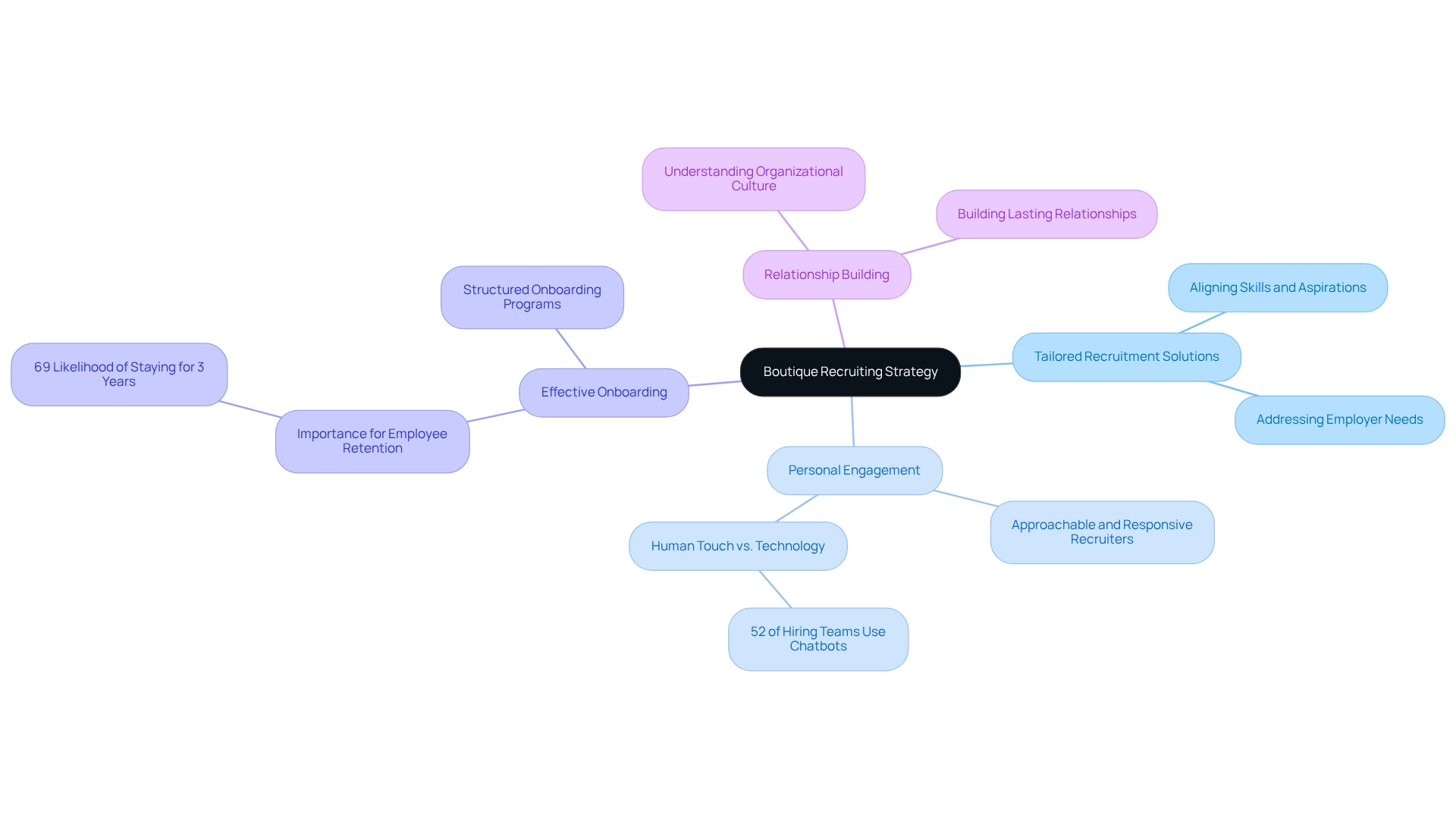
Align Your Values: Expressing Passion for the Company’s Mission
When responding to the question, I will give clear answers to why I want this job. It is crucial to articulate how your personal values align with the organization’s mission. Begin by researching the organization’s core values and identifying aspects that resonate with your own beliefs. This alignment not only showcases your genuine interest but also signals to employers that you are likely to be a committed and engaged employee. In fact, employees who feel satisfied with their work-life balance are 2.1 times more likely to recommend their organization to others. This underscores the importance of cultural fit in employee retention and highlights how personal values can enhance workplace satisfaction.
Demonstrating enthusiasm for an organization’s mission can be accomplished through specific examples. For instance, applicants might share experiences that reflect their dedication to comparable values, illustrating how they can contribute positively to the workplace culture. Additionally, providing the answers to why I want this job, whether for career growth, new challenges, or a change in environment, can further illustrate your authenticity. A study revealed that 64% of employees who perceive their workplace culture as poor have actively sought new job opportunities in the past six months. This statistic highlights the necessity for organizations to cultivate a positive environment and demonstrates how candidates can convey their alignment with organizational values by discussing their dedication to enhancing workplace culture.
Furthermore, aligning personal values with an organization’s mission enhances employee engagement, which is essential in 2025’s competitive job market. Candidates should be prepared to discuss how their values not only align with the company’s mission but also how they can help promote it. It is important to be forthcoming about your workstyle preferences, such as whether you prefer a hybrid, on-site, or remote work arrangement, and to clearly communicate your salary expectations. Sharing personal insights, while maintaining professionalism, can create a deeper connection with the hiring manager. As Catharina Bruns, founder of WorkIsNotaJob, states, “Empower yourself and realize the importance of contributing to the world by living your talent. Work on what you love.” This approach not only strengthens their candidacy but also contributes to a more engaged workforce, ultimately benefiting the organization as a whole.
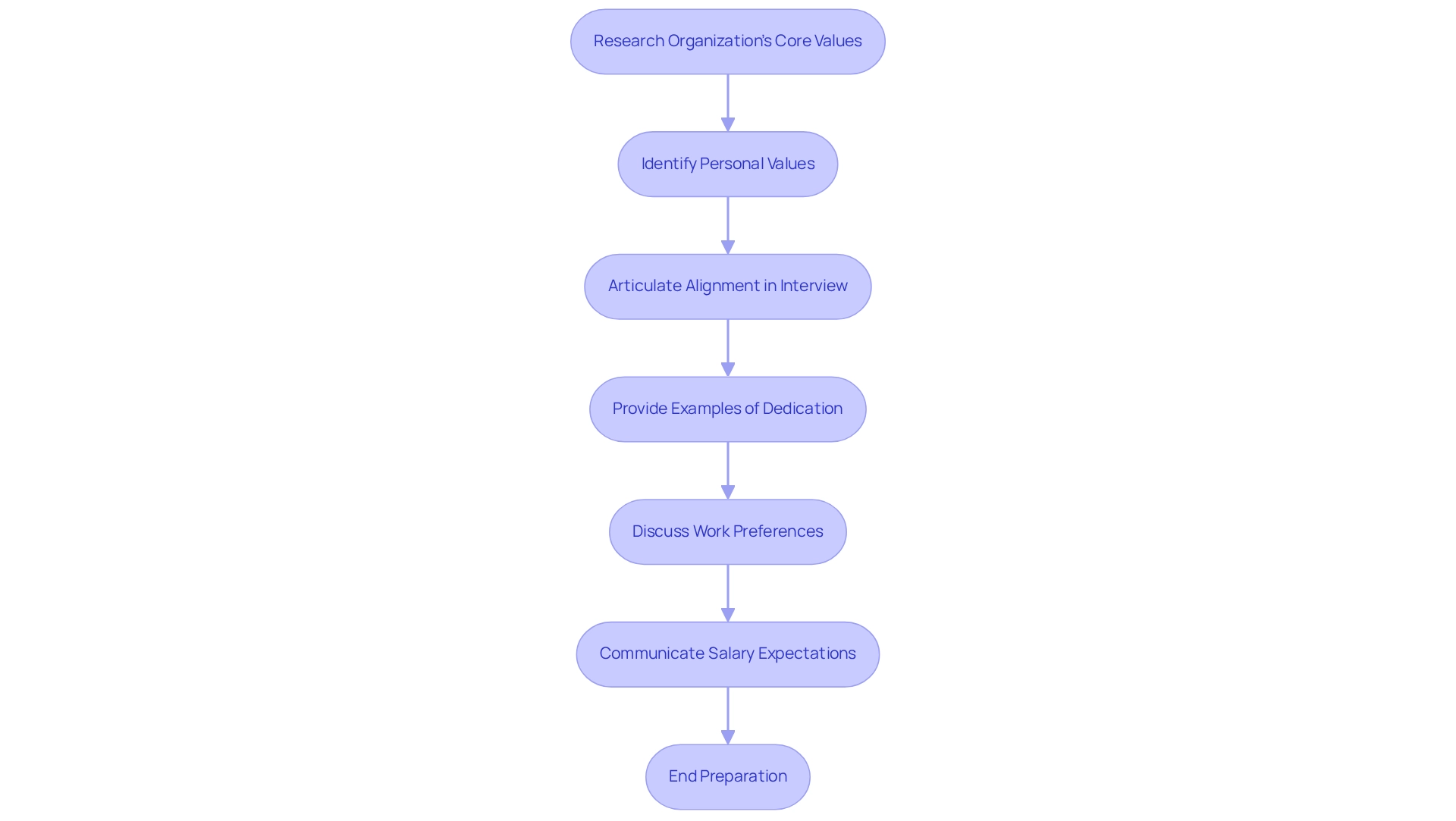
Showcase Your Skills: Connecting Personal Expertise to Job Responsibilities
To impress employers, applicants must provide answers to why I want this job by effectively linking their personal expertise to the specific job responsibilities detailed in the job description. This connection is crucial, especially in a competitive job market where employers increasingly value skills over formal education. The current landscape reveals a fierce competition for skilled individuals, where top prospects are not merely seeking any position but the right role within the appropriate organization. Intelligent and resourceful candidates are interviewing employers as much as they are being interviewed, making it essential for hiring managers to handle the interview process seamlessly to avoid losing out on top talent.
Consider this: an analysis of over 51 million job postings from 2017 to 2020 indicates a significant shift, with many employers relaxing degree requirements for middle-skill positions, thereby emphasizing the importance of practical skills and experience. This trend is further supported by a growing skepticism among U.S. residents regarding the value of a college degree, with over half believing it is a poor investment. This skepticism has prompted many employers to reconsider degree requirements, fostering a more inclusive hiring landscape that values skills and experience over formal education.
Candidates should utilize specific examples from their past experiences to illustrate how their skills can directly contribute to the company’s success. This approach not only showcases qualifications but also offers answers to why I want this job, demonstrating a clear understanding of the role and its requirements. For instance, an applicant who has successfully led a project can highlight how their leadership and project management skills align with the responsibilities of the position they are applying for.
Moreover, HR experts emphasize the importance of interpersonal skills in fostering a positive work environment and advancing careers. Candidates should be prepared to discuss how their soft skills, such as communication and teamwork, complement their technical abilities. For instance, an applicant might share a situation where their effective communication led to a successful team project, illustrating how these skills have positively impacted hiring decisions in practice. This comprehensive perspective on skill demonstration can greatly influence hiring choices.
In interviews, applicants can improve their responses by highlighting abilities through pertinent case studies. For example, an applicant might mention a scenario where they successfully resolved an issue or enhanced a procedure, thus demonstrating their ability to fulfill job requirements. By articulating these connections clearly, individuals not only stand out but also provide answers to why I want this job, which aligns them with the evolving expectations of employers who are increasingly focused on skills matching in recruitment. As the finest applicants remain vigilant for red flags during the interview process, ensuring a seamless and captivating experience is essential for attracting and retaining top talent. Hiring managers must prioritize a smooth interview process to create a positive impression and draw in the top applicants.
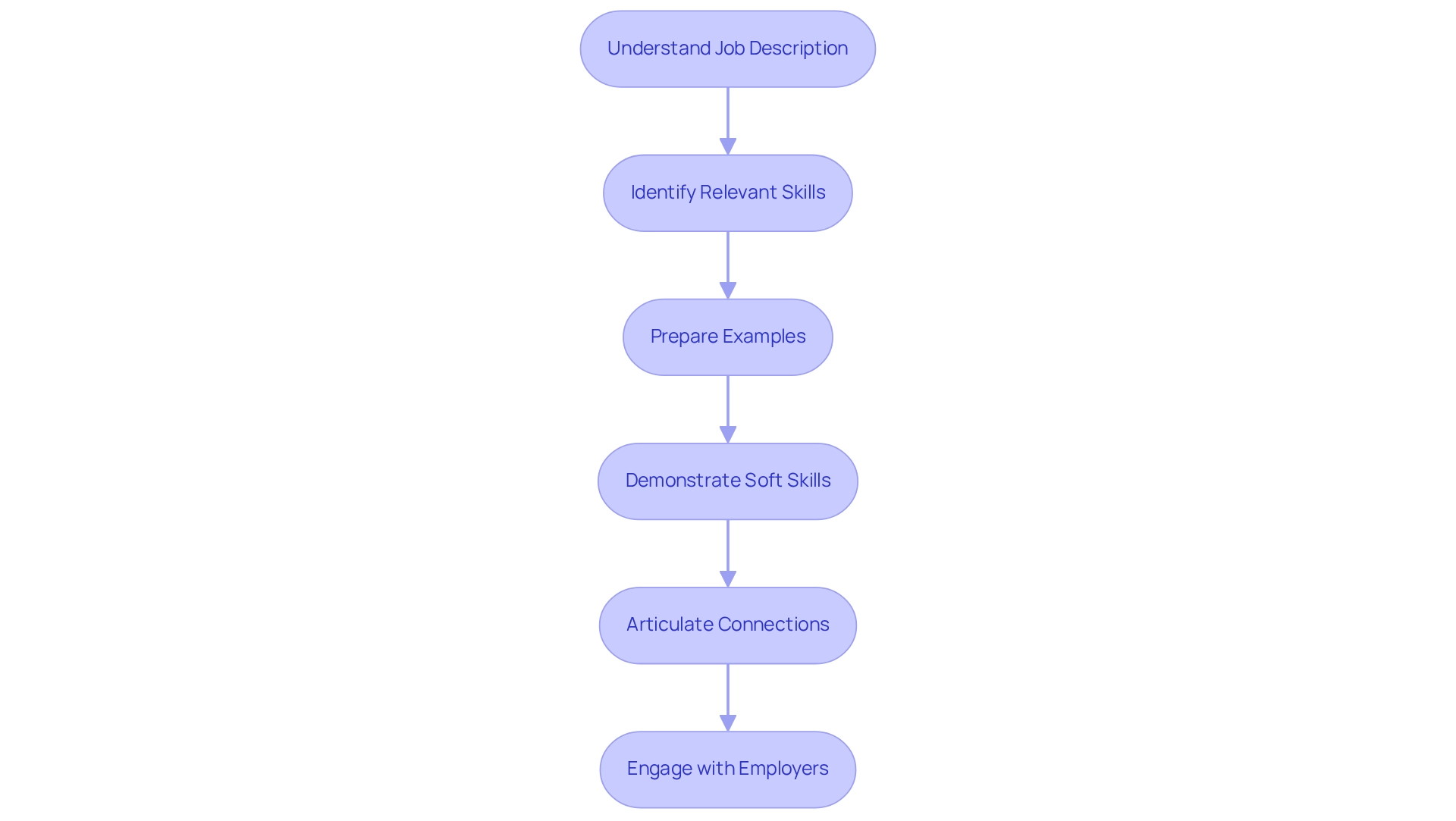
Demonstrate Enthusiasm: Conveying Genuine Interest in the Role
Employers prioritize applicants who demonstrate genuine enthusiasm for the role. To effectively convey this enthusiasm, applicants must actively engage during the interview by:
- Asking insightful questions
- Expressing excitement about the company’s projects and culture
Sharing personal anecdotes that illustrate a passion for the industry can leave a lasting impression. Notably, statistics reveal that 22% of hiring managers feel that receiving a thank-you note significantly influences their decision-making, underscoring the importance of follow-up communication.
Furthermore, body language plays a crucial part, representing 55% of communication; hence, individuals should be aware of their non-verbal signals, as positive body language can further express their enthusiasm. In today’s swiftly changing job market, grasping technology trends in interviewing can assist applicants in adjusting their strategies to showcase enthusiasm effectively.
Including motivational quotes can further assist individuals in handling interview anxiety; choosing quotes that resonate personally can offer focus and confidence throughout the interview process. By demonstrating enthusiasm through thoughtful engagement, personal storytelling, and an awareness of non-verbal communication, individuals can effectively showcase their genuine interest in the role, providing clear answers to why I want this job, which makes them more appealing to potential employers.
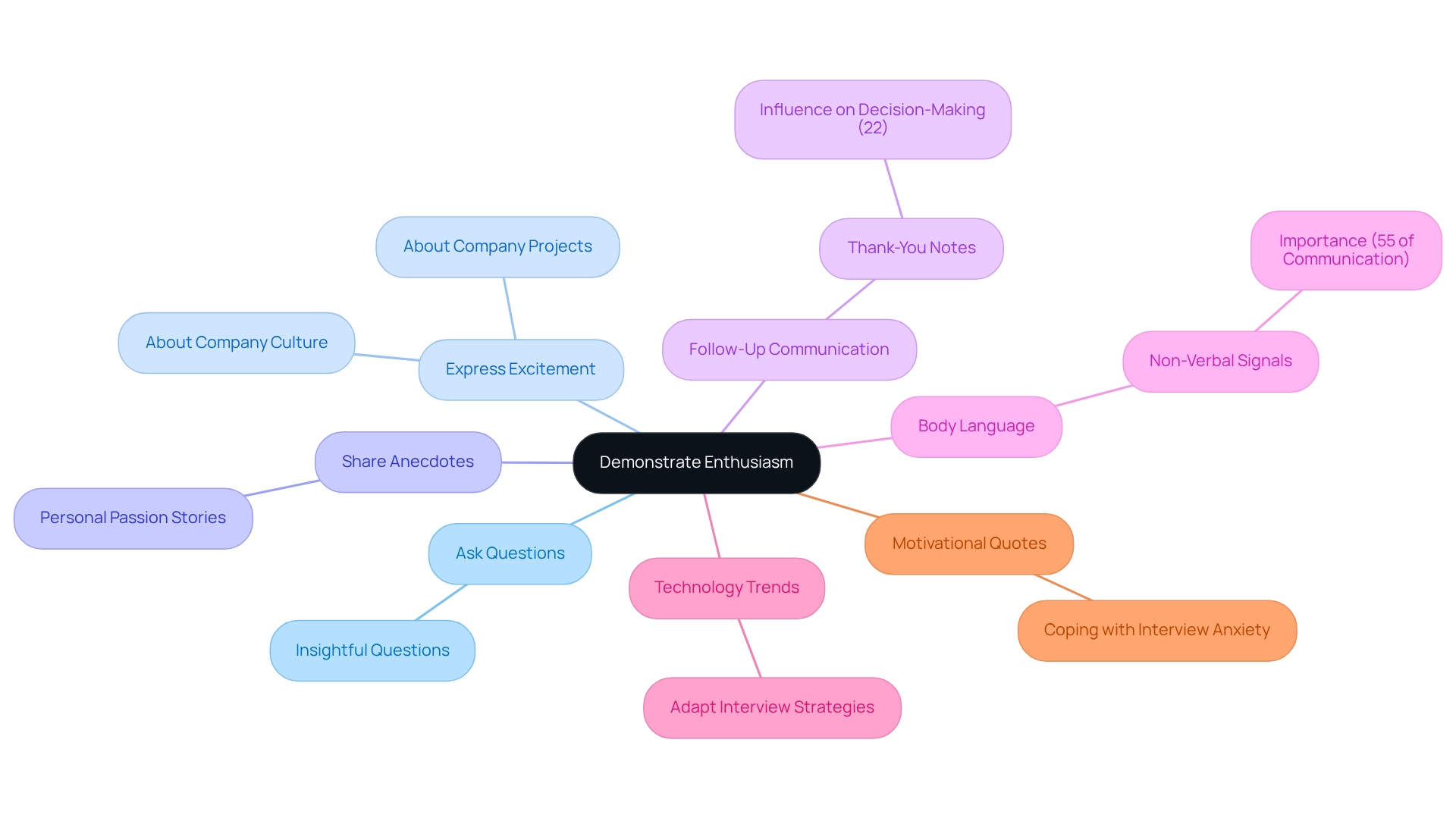
Outline Your Career Goals: Linking Short-Term Aspirations to Long-Term Success
When articulating your answers to why I want this job, it is essential to clearly outline your short-term career goals and how they align with your long-term vision. This approach not only demonstrates to employers your focus on immediate employment but also offers answers to why I want this job by highlighting your commitment to growth and contribution within the organization over time. Be specific about the skills you aim to develop and how this role fits into your overall career trajectory.
Research indicates that individuals who effectively connect their career goals to job opportunities are more likely to impress employers. In fact, aligning career goals with job roles can significantly enhance your chances of success in the hiring process. For instance, 43% of Americans abandon their New Year’s resolutions by the end of January, underscoring the importance of setting achievable, relevant goals that can be consistently pursued in your career.
Moreover, it is crucial to explore all available job offers before making a decision. Candidates should not feel pressured to accept the first offer they receive, as doing so may lead to missed opportunities that better align with their long-term aspirations. Committing too quickly to a job offer can result in regret, as it may not be the best fit for your career goals. Taking the time to consider multiple options can reveal roles that challenge professional growth and offer benefits that may not be immediately apparent.
Expert opinions suggest that outlining career aspirations during interviews is vital because it provides answers to why I want this job, allowing candidates to demonstrate their foresight and strategic thinking. This not only supports personal growth but also assures employers of your ability to contribute meaningfully to the organization. Additionally, case studies reveal that organizations prioritizing flexibility in goal setting see better alignment between short-term objectives and long-term success. By articulating how your immediate goals can evolve into significant contributions while emphasizing the importance of exploring various job opportunities, you position yourself as a valuable asset to potential employers.
As Ryan Bradshaw aptly states, “Business success isn’t just about setting big goals, it’s about consistently reinforcing those goals through intentional daily habits.” This reinforces the idea that maintaining focus on both short-term and long-term goals, while being open to exploring multiple job offers, is essential for career advancement.
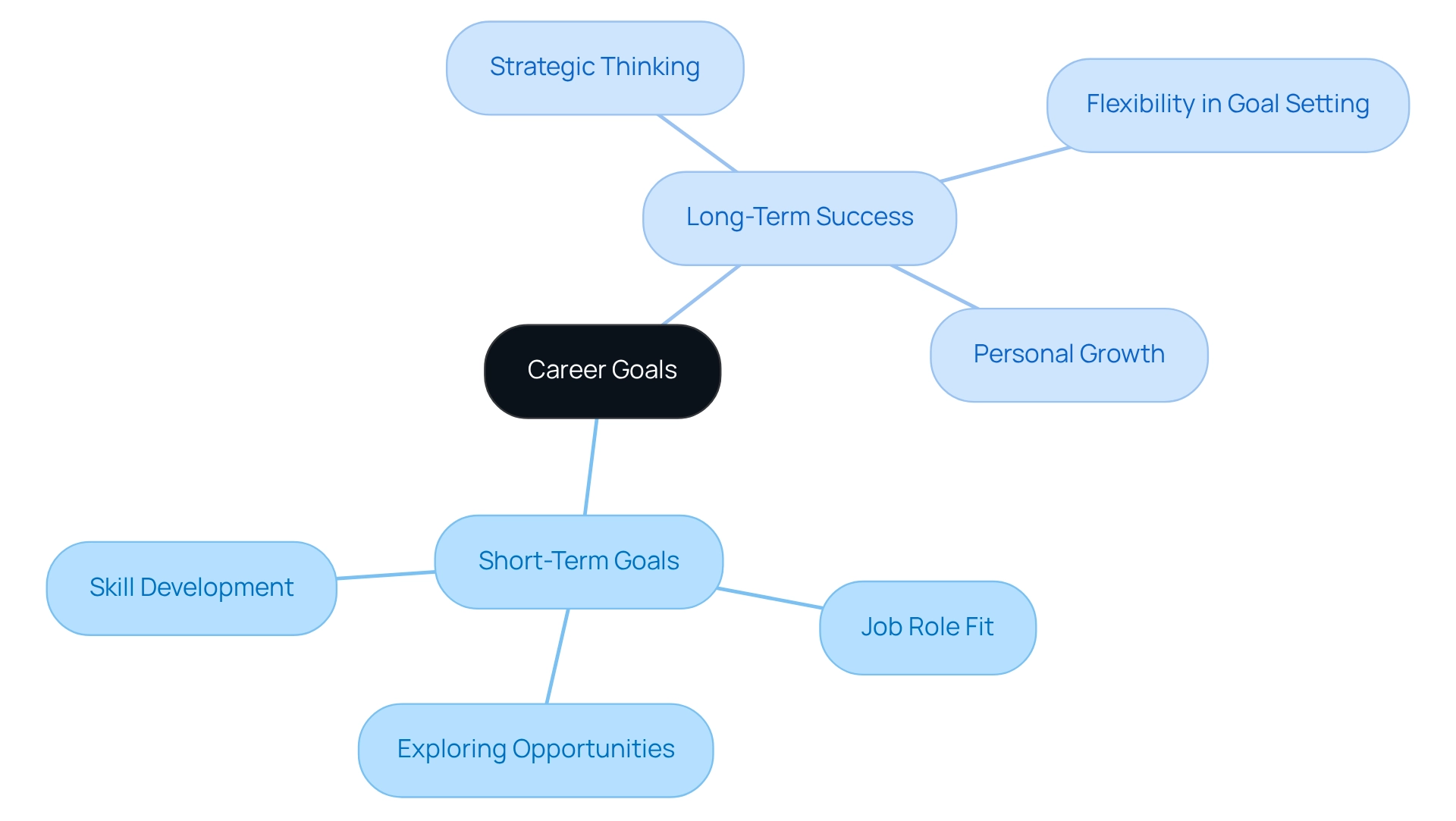
Research the Company: Crafting Informed and Relevant Answers
Candidates must conduct thorough research on the organization before their interviews, concentrating on its mission, values, recent developments, and industry standing. This preparation empowers applicants to tailor their responses, aligning them with the company’s goals and culture, thus enhancing their relevance and impact. A well-informed applicant not only demonstrates genuine interest in the position but also significantly improves their chances of success.
Statistics reveal that candidates respond positively to job descriptions that steer clear of generic language, underscoring the necessity for customized communication. Moreover, case studies indicate that the probability of receiving a job offer escalates to 51% after three interviews, highlighting the critical importance of persistence and preparation. As Andrei Kurtuy, Co-Founder & Career Expert, states, “The corporate hiring procedure has grown more intricate, with 99 percent of Fortune 500 firms now utilizing Applicant Tracking Systems to evaluate applicants.” In this competitive landscape, candidates must recognize that leading organizations seek the right fit, making it essential to present themselves effectively.
Hiring managers should remain vigilant for potential warning signs during the interview process, as top candidates are evaluating the organization just as rigorously as they are being assessed. By understanding the organization’s philosophy and adapting their responses accordingly, applicants can provide answers to why I want this job, significantly enhancing their interview performance and leaving a lasting impression. Furthermore, improving the applicant experience through feedback and communication can fortify the employer brand, rendering the job application process valuable for individuals.
To maximize their opportunities for success, candidates should formulate targeted inquiries that reflect their research and demonstrate their engagement with the organization.
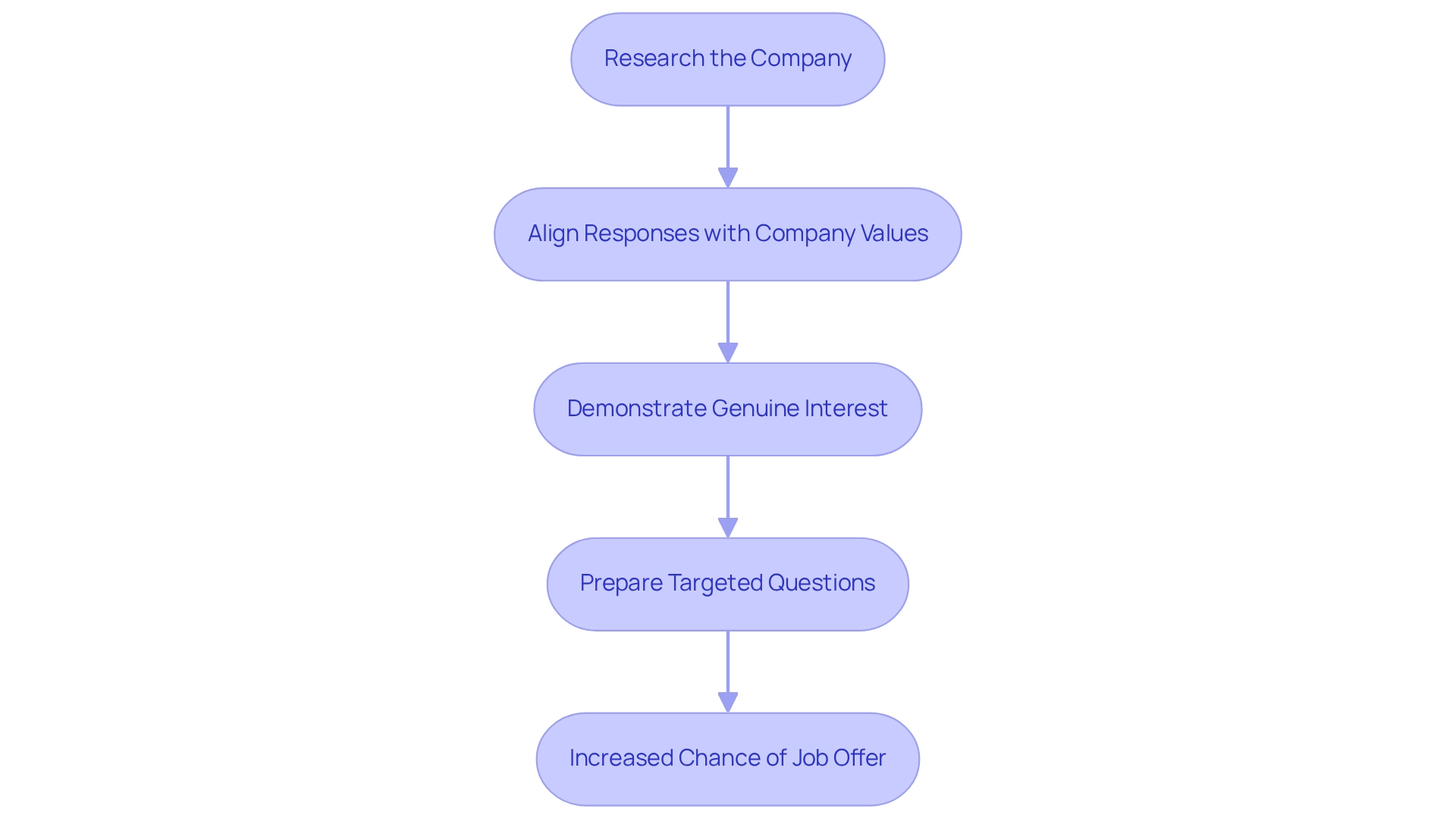
Use Specific Examples: Illustrating Your Interest with Real-Life Scenarios
Candidates must come prepared with specific examples from their past experiences that effectively showcase their skills and serve as answers to why I want this job. For instance, discussing a successful project where relevant skills were applied can vividly illustrate both capability and enthusiasm. These real-life scenarios not only make responses more relatable but also enable interviewers to visualize the individual’s potential contributions to the organization.
In today’s competitive job market, where top applicants are selective about their job options, it is essential for individuals to align their personal values with the company’s culture during interviews. Statistics reveal that 53% of employees regard work-life balance as vital when evaluating job offers. This highlights the necessity for applicants to demonstrate how their experiences can fulfill changing organizational requirements. Hiring managers must manage the interview process smoothly to prevent losing top talent; any errors can raise red flags for discerning individuals.
Utilizing specific examples during interviews can offer answers to why I want this job and significantly influence hiring decisions. Candidates who effectively illustrate their answers to why I want this job through real-life scenarios often leave a lasting impression. As Confucius stated, “Reputation cannot be built on intentions alone,” emphasizing the necessity of demonstrating capabilities through action. In a landscape where applicants are evaluating potential employers, case studies indicate that those who express their experiences in alignment with the company’s objectives are more likely to be regarded positively. By preparing these examples, applicants not only improve their interview performance but also position themselves as valuable assets to prospective employers.
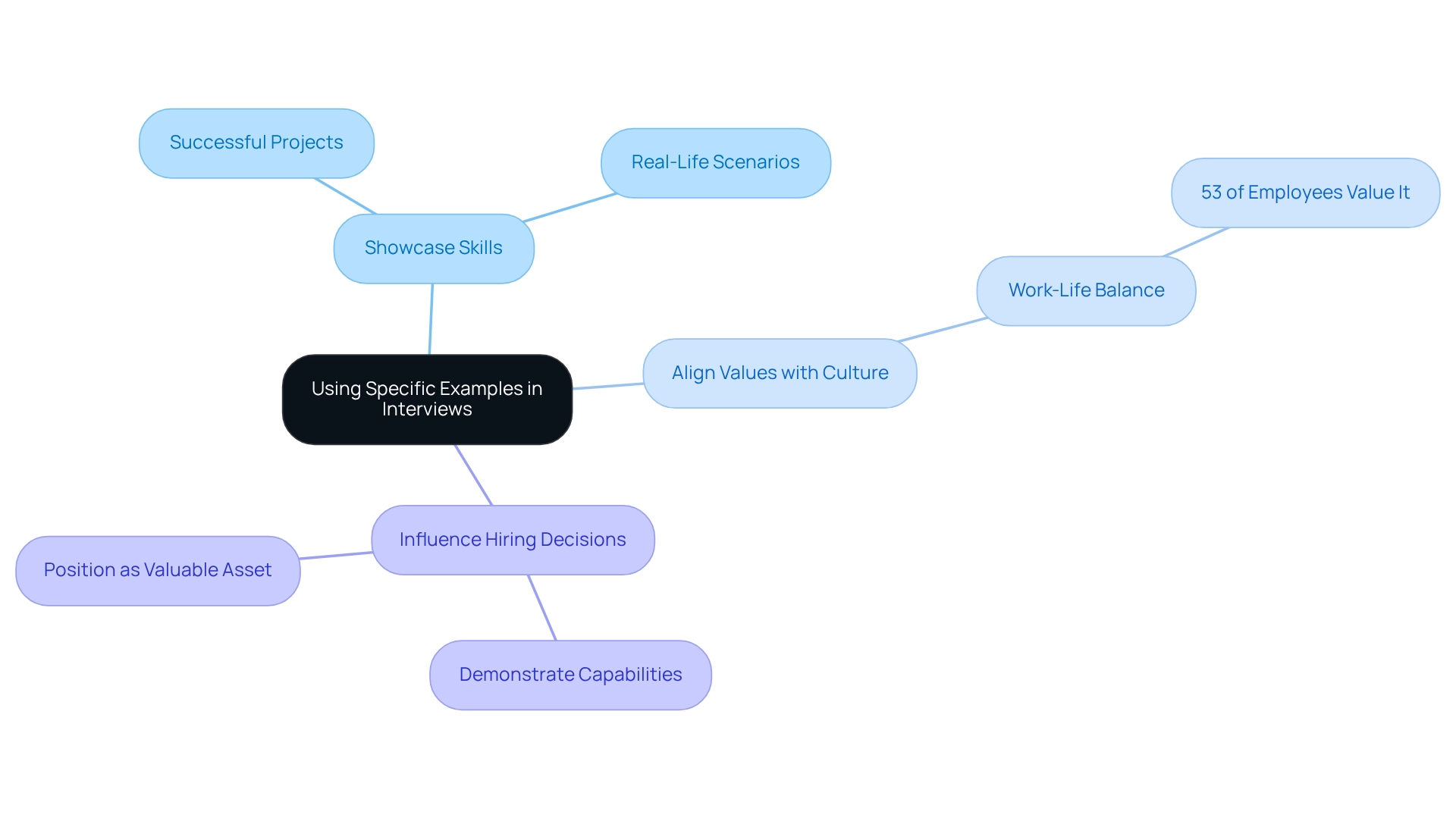
Be Authentic: Honesty as a Key to Building Employer Trust
Authenticity during the interview process is crucial for establishing trust with potential employers. Candidates should aim to present their true selves by articulating their genuine motivations and aspirations, which serve as answers to why I want this job. This level of honesty fosters a positive connection with interviewers and guarantees that individuals obtain roles that align with their genuine interests and values. Research indicates that applicants who demonstrate authenticity are more likely to be viewed as trustworthy, significantly impacting hiring decisions. Favorable evaluations from former employers frequently emphasize the significance of applicants being open about their abilities and experiences, reinforcing the notion that honesty is a crucial element of successful employee-employer relationships.
A case study titled “Building Trust Through Positive Reviews” emphasizes how authentic positive reviews enhance credibility and influence hiring decisions, showcasing the impact of transparency on employer trust. Moreover, Eric Eddy from CPA Resources Global Professionals observed, “Boutique Recruiting’s capability to provide exceptional applicants swiftly and effectively,” highlighting the significance of authenticity in the recruitment process.
Candidates should also keep in mind that the first job offer may not always be the best. Exploring various options can uncover opportunities that better align with long-term goals, as firms often offer advantages and growth potential that applicants may not initially contemplate. It is essential to avoid the trap of accepting the first job offer that comes along, as this may lead to regret.
Statistics indicate that individuals who establish trust through transparency during interviews tend to experience higher job satisfaction and retention rates. By prioritizing authenticity and taking the time to evaluate all available options, applicants can discover answers to why I want this job, which improves their chances of being hired and paves the way for a more fulfilling career aligned with their personal and professional goals. Building trust through authenticity can serve as a damage control strategy, assisting in reducing potential hiring errors and ensuring a better match for both applicants and employers.
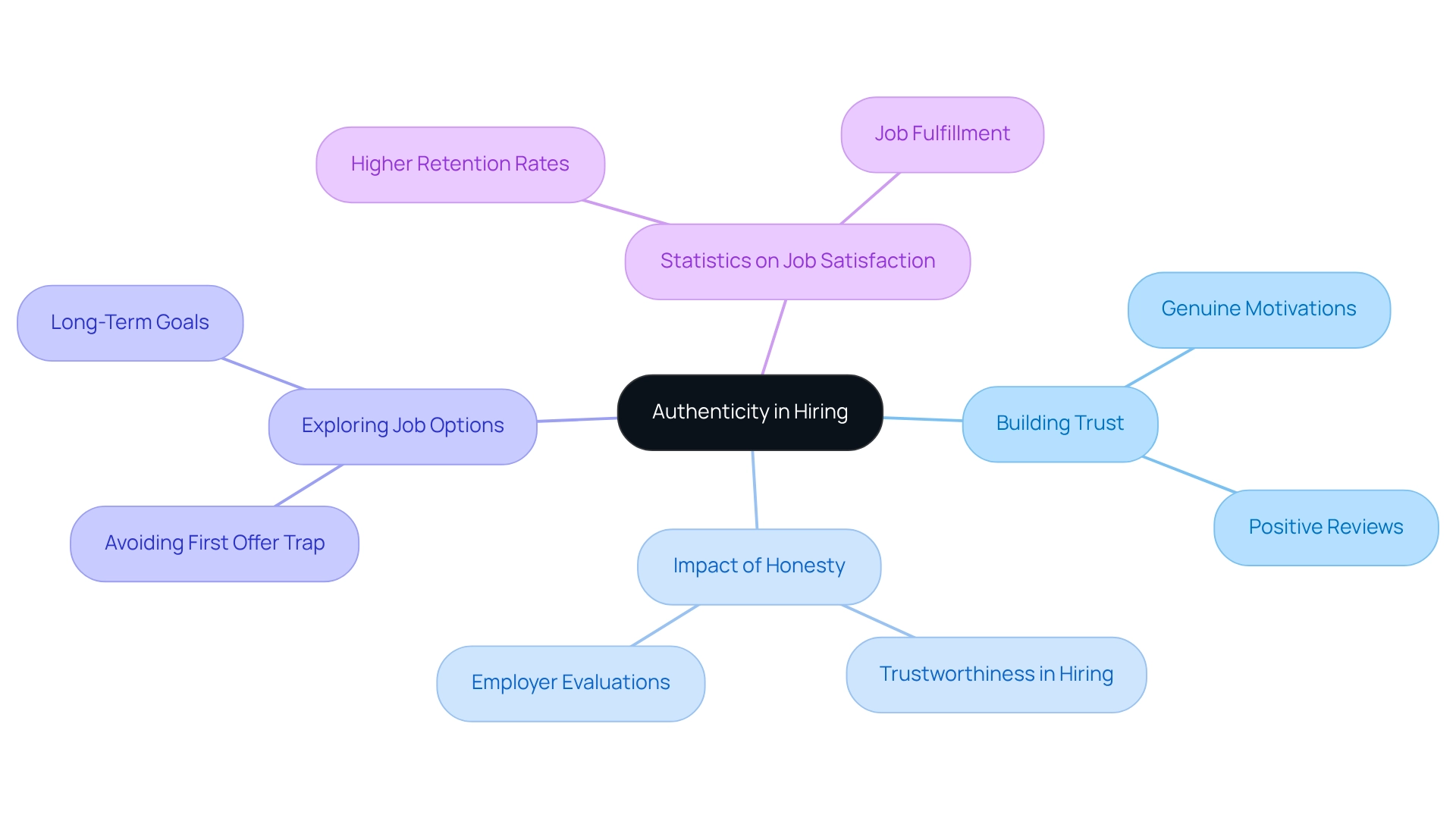
Highlight Growth Opportunities: Connecting the Role to Personal Development
During interviews, candidates must proactively convey their interest in growth opportunities associated with the role. Articulating how the position aligns with personal development objectives and identifying specific skills to be acquired not only showcases ambition but also signals to employers a commitment to long-term growth and meaningful contribution.
Research indicates that employees who cultivate friendships at work report 50% higher job satisfaction, underscoring the importance of a supportive environment for personal growth. Furthermore, a significant 84% of organizations recognize that fostering a learning culture enhances organizational resilience and workplace morale, which is vital for both individual and collective success.
Candidates can reference case studies that illustrate the impact of leadership training on performance, revealing that such development initiatives can boost learning capacity by 25% and performance by 20%. This highlights the critical role of ongoing personal development in attaining career success. Supporting current leaders through training not only enhances their effectiveness but also contributes to team development, thereby nurturing a stronger workplace culture.
When discussing personal development during interviews, applicants should be ready to provide answers to why they want this job, including examples of how they have actively pursued growth opportunities and envision their career trajectory within the organization. Moreover, they can formulate specific inquiries regarding the company’s commitment to employee development and training programs. This strategy not only reinforces their dedication to self-improvement but also aligns their aspirations with the organization’s goals, making them a more attractive candidate.
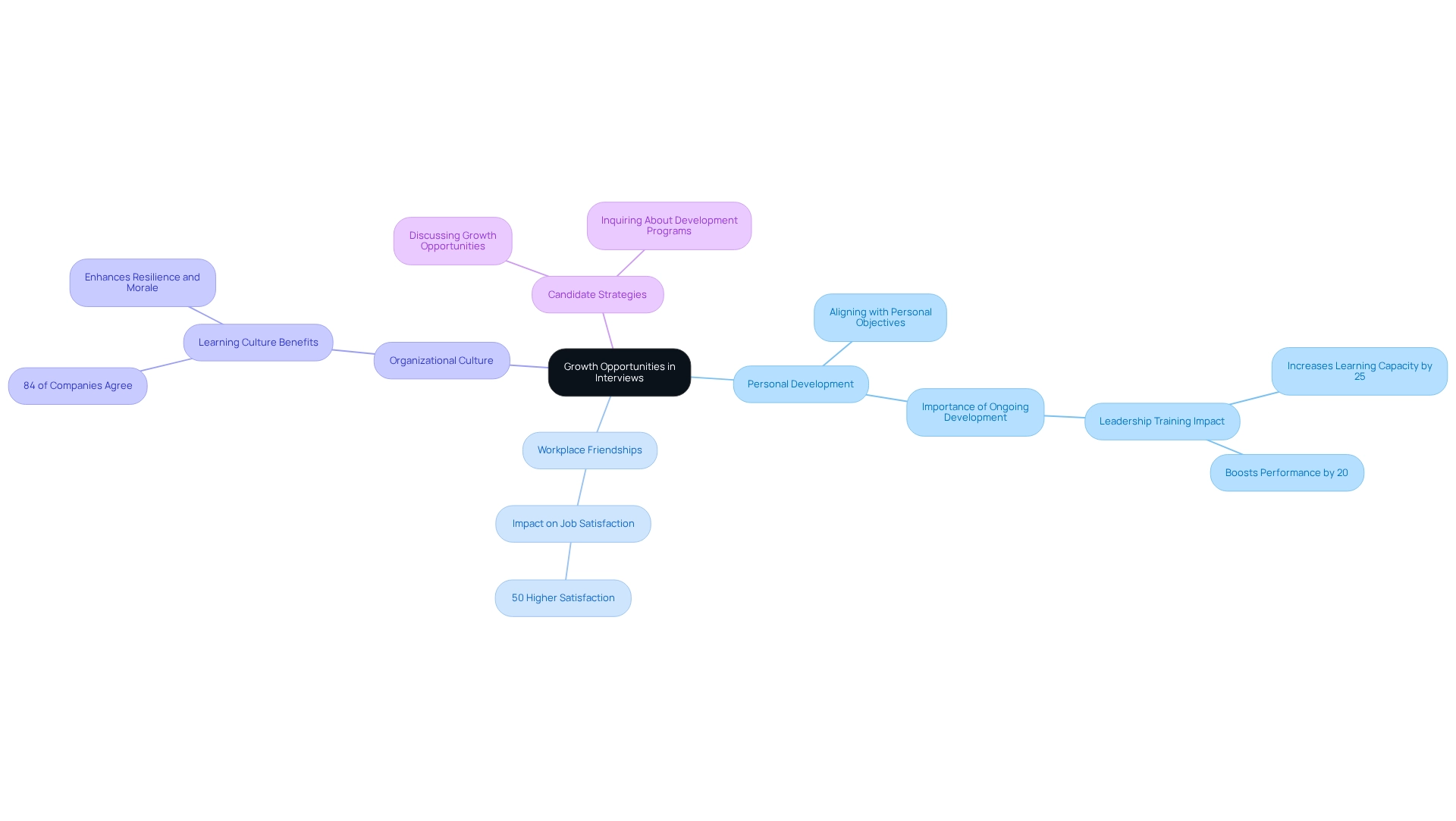
Leave a Lasting Impression: Crafting a Memorable Closing Statement
At the conclusion of an interview, applicants must prioritize crafting a memorable closing statement that succinctly summarizes their qualifications and includes answers to why I want this job, while conveying genuine enthusiasm for the role. This moment serves as a critical opportunity to remind the interviewer of key strengths and how they align with the company’s specific needs, which provides answers to why I want this job. A carefully crafted closing statement can provide answers to why I want this job and significantly influence hiring decisions, creating a lasting impact that highlights the individual’s suitability.
The significance of closing statements cannot be overstated, as they often serve as answers to why I want this job, representing the final touchpoint in the interview process. Research indicates that a strong closing can provide answers to why I want this job and enhance an applicant’s chances of being remembered positively. Consider this: applicants who effectively summarize their qualifications and provide answers to why I want this job are more likely to distinguish themselves in a competitive job market. Indeed, statistics reveal that 37% of applicants utilize professional networks, and nearly 50% learn about job opportunities through word of mouth, underscoring the critical role of effective communication in job acquisition.
Expert insights suggest that a well-crafted closing statement should incorporate a brief recap of relevant skills and experiences to provide answers to why I want this job. This approach not only emphasizes the applicant’s suitability for the position but also provides answers to why I want this job by highlighting their understanding of the organization’s culture and objectives. Candidates must remain vigilant against common pitfalls during the interview process, such as disorganization or lack of clarity, which can detract from their overall impression. As noted by Jobvite, effective communication offers answers to why I want this job by making a lasting impression.
Case studies illustrate that applicants who employ effective closing statements frequently receive positive feedback from employers. For instance, Boutique Recruiting’s commitment to quality demonstrates how effective communication, including closing statements, contributes to successful hiring outcomes. An applicant who succinctly articulated their unique contributions and expressed enthusiasm for the company’s mission secured a position despite facing a highly competitive pool of candidates.
Examples of impactful closing statements include phrases like, “I am excited about the opportunity to contribute to your team and leverage my skills in [specific area] to drive success at [Company Name].” Such statements resonate with employers, reinforcing the individual’s commitment and readiness to add value.
In summary, the ability to create a memorable closing statement is an essential skill for applicants and offers answers to why I want this job. It encapsulates their qualifications and leaves a positive impression that can influence hiring decisions in their favor, particularly in an environment where candidates are keenly observing the interview process for red flags. To enhance your chances of success, consider reaching out to Boutique Recruiting for expert guidance on navigating the hiring process and avoiding common pitfalls.
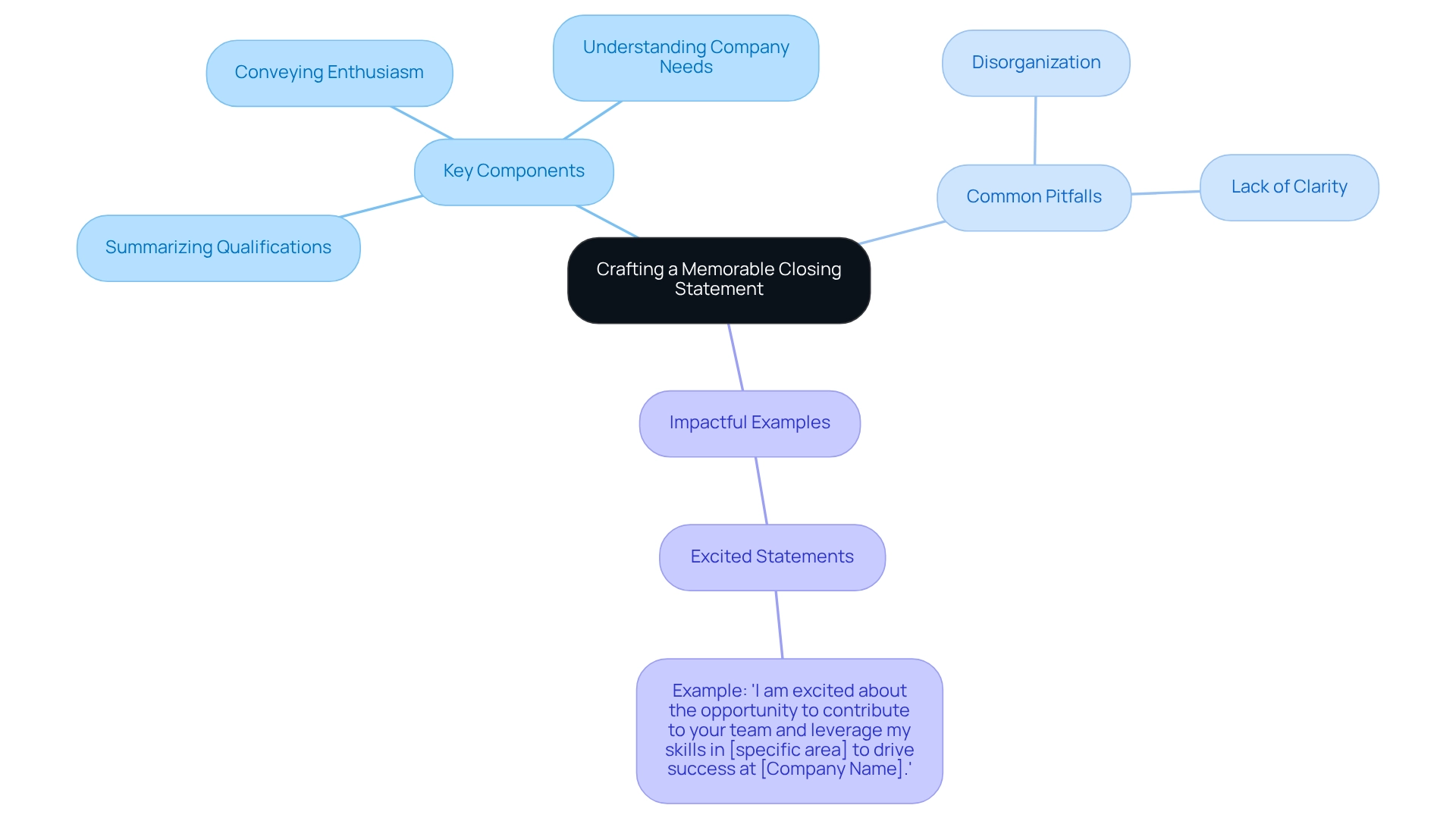
Conclusion
The personalized recruitment approach championed by Boutique Recruiting serves as a pivotal shift in the competitive job market. By prioritizing individual aspirations and cultural fit, the firm adeptly connects high-quality candidates with employers, ensuring a more fulfilling career journey for both parties. Candidates are empowered to take charge of their job search by aligning their personal values with company missions, showcasing relevant skills, and demonstrating genuine enthusiasm throughout the interview process.
Key strategies highlighted in this article, such as articulating career goals, researching prospective employers, and presenting authentic narratives, are crucial for candidates aiming to distinguish themselves. The significance of a seamless interview experience cannot be overstated, as both candidates and employers evaluate mutual compatibility. By concentrating on personal growth and development opportunities, candidates not only enhance their chances of securing a role but also establish a foundation for long-term career satisfaction and success.
Ultimately, the recruitment landscape is evolving towards a model that values human connection alongside technological advancements. Boutique Recruiting exemplifies this evolution by fostering meaningful relationships between candidates and employers, which is vital for effective onboarding and employee retention. In this changing environment, candidates who embrace this tailored approach to recruitment will find themselves better positioned to navigate their career aspirations and achieve enduring success.
Frequently Asked Questions
What is Boutique Recruiting’s approach to connecting talent with employers?
Boutique Recruiting utilizes a tailored recruitment strategy that aligns individuals with roles matching their skills and aspirations while addressing the specific needs of employers.
How does Boutique Recruiting differentiate itself in a technology-driven job market?
The firm emphasizes personal engagement over technology by providing tailored solutions for applicants, ensuring that each candidate receives individualized attention that resonates with their career objectives.
What role does effective onboarding play in employee retention according to Boutique Recruiting?
Effective onboarding is vital for employee retention, as research indicates that 69% of employees are likely to stay with a company for at least three years if they have an exceptional onboarding experience.
How does Boutique Recruiting ensure candidates fit within an organization’s culture?
Boutique Recruiting focuses on understanding both the technical requirements and the organizational culture, ensuring that candidates are not only qualified but also well-aligned with the workplace environment.
What is the significance of aligning personal values with an organization’s mission during the job application process?
Aligning personal values with an organization’s mission demonstrates genuine interest and can signal to employers that the candidate is likely to be committed and engaged, enhancing workplace satisfaction.
How can candidates effectively communicate their fit for a job during interviews?
Candidates should provide specific examples that link their personal expertise to the job responsibilities, demonstrating how their skills can contribute to the company’s success while also expressing their alignment with the organization’s values.
What trends are influencing the hiring landscape in terms of skills versus formal education?
Many employers are relaxing degree requirements for middle-skill positions, emphasizing practical skills and experience over formal education, reflecting a growing skepticism regarding the value of a college degree.
Why is it important for candidates to highlight interpersonal skills in addition to technical abilities?
Interpersonal skills, such as communication and teamwork, are crucial for fostering a positive work environment and advancing careers, making them important to discuss during the application process.
What should candidates do to prepare for interviews to impress employers?
Candidates should prepare by showcasing their skills through relevant examples and case studies, clearly articulating how their experiences align with the job requirements to stand out to employers.
{“@context”: “https://schema.org”, “@type”: “FAQPage”, “mainEntity”: [{“@type”: “Question”, “name”: “What is Boutique Recruiting’s approach to connecting talent with employers?”, “acceptedAnswer”: {“@type”: “Answer”, “text”: “Boutique Recruiting utilizes a tailored recruitment strategy that aligns individuals with roles matching their skills and aspirations while addressing the specific needs of employers.”}}, {“@type”: “Question”, “name”: “How does Boutique Recruiting differentiate itself in a technology-driven job market?”, “acceptedAnswer”: {“@type”: “Answer”, “text”: “The firm emphasizes personal engagement over technology by providing tailored solutions for applicants, ensuring that each candidate receives individualized attention that resonates with their career objectives.”}}, {“@type”: “Question”, “name”: “What role does effective onboarding play in employee retention according to Boutique Recruiting?”, “acceptedAnswer”: {“@type”: “Answer”, “text”: “Effective onboarding is vital for employee retention, as research indicates that 69% of employees are likely to stay with a company for at least three years if they have an exceptional onboarding experience.”}}, {“@type”: “Question”, “name”: “How does Boutique Recruiting ensure candidates fit within an organization’s culture?”, “acceptedAnswer”: {“@type”: “Answer”, “text”: “Boutique Recruiting focuses on understanding both the technical requirements and the organizational culture, ensuring that candidates are not only qualified but also well-aligned with the workplace environment.”}}, {“@type”: “Question”, “name”: “What is the significance of aligning personal values with an organization\u2019s mission during the job application process?”, “acceptedAnswer”: {“@type”: “Answer”, “text”: “Aligning personal values with an organization\u2019s mission demonstrates genuine interest and can signal to employers that the candidate is likely to be committed and engaged, enhancing workplace satisfaction.”}}, {“@type”: “Question”, “name”: “How can candidates effectively communicate their fit for a job during interviews?”, “acceptedAnswer”: {“@type”: “Answer”, “text”: “Candidates should provide specific examples that link their personal expertise to the job responsibilities, demonstrating how their skills can contribute to the company’s success while also expressing their alignment with the organization’s values.”}}, {“@type”: “Question”, “name”: “What trends are influencing the hiring landscape in terms of skills versus formal education?”, “acceptedAnswer”: {“@type”: “Answer”, “text”: “Many employers are relaxing degree requirements for middle-skill positions, emphasizing practical skills and experience over formal education, reflecting a growing skepticism regarding the value of a college degree.”}}, {“@type”: “Question”, “name”: “Why is it important for candidates to highlight interpersonal skills in addition to technical abilities?”, “acceptedAnswer”: {“@type”: “Answer”, “text”: “Interpersonal skills, such as communication and teamwork, are crucial for fostering a positive work environment and advancing careers, making them important to discuss during the application process.”}}, {“@type”: “Question”, “name”: “What should candidates do to prepare for interviews to impress employers?”, “acceptedAnswer”: {“@type”: “Answer”, “text”: “Candidates should prepare by showcasing their skills through relevant examples and case studies, clearly articulating how their experiences align with the job requirements to stand out to employers.”}}]}{“@context”: “https://schema.org”, “@type”: “BlogPosting”, “headline”: “9 Answers to Why I Want This Job That Impress Employers”, “description”: “Impress employers with tailored answers to why you want this job, showcasing genuine interest.”, “datePublished”: “2025-05-09T00:00:03.759000”, “image”: [“https://images.tely.ai/telyai/jkbbhhnf-the-central-node-shows-the-main-strategy-while-branches-reveal-key-focus-areas-and-statistics-that-support-the-effectiveness-of-boutique-recruitings-personalized-approach.webp”, “https://images.tely.ai/telyai/wtohjjyf-follow-the-arrows-through-each-box-to-see-how-to-prepare-for-discussing-your-fit-with-the-companys-mission-starting-with-research-and-ending-with-clear-communication-during-the-interview.webp”, “https://images.tely.ai/telyai/wrgzfihs-each-box-represents-a-crucial-step-in-preparing-for-an-interview-follow-the-arrows-to-see-how-to-effectively-showcase-your-skills-and-experiences-to-impress-employers.webp”, “https://images.tely.ai/telyai/boraphun-the-central-idea-is-about-showcasing-enthusiasm-each-branch-represents-a-different-strategy-with-sub-branches-detailing-specific-actions-or-insights-that-support-that-strategy.webp”, “https://images.tely.ai/telyai/dxbbemju-the-center-node-represents-your-career-goals-while-the-branches-show-how-short-term-actions-tie-into-your-long-term-vision-each-sub-node-provides-specific-actions-or-concepts-that-contribute-to-your-overall-career-strategy.webp”, “https://images.tely.ai/telyai/dhwycyvu-follow-the-flow-from-researching-the-company-to-tailoring-your-responses-each-step-builds-on-the-previous-one-leading-to-a-greater-chance-of-receiving-a-job-offer.webp”, “https://images.tely.ai/telyai/jryjvsoe-the-central-node-represents-the-main-theme-while-the-branches-illustrate-different-strategies-and-concepts-each-sub-node-provides-specific-actions-or-insights-related-to-that-strategy-helping-you-understand-how-to-effectively-prepare-for-interviews.webp”, “https://images.tely.ai/telyai/gbllnumd-the-central-node-represents-the-core-theme-of-authenticity-with-branches-showing-key-ideas-and-sub-branches-providing-details-follow-the-connections-to-see-how-each-aspect-contributes-to-building-trust-in-the-hiring-process.webp”, “https://images.tely.ai/telyai/qppjfiuy-the-center-represents-the-main-theme-while-branches-illustrate-related-concepts-and-strategies-that-candidates-can-utilize-to-demonstrate-their-commitment-to-growth-during-job-interviews.webp”, “https://images.tely.ai/telyai/yhsbsaiu-the-center-shows-the-main-idea-of-creating-a-lasting-impression-in-interviews-while-the-branches-represent-key-strategies-potential-pitfalls-and-effective-examples-that-can-help-candidates-excel.webp”], “articleBody”: “## Overview\nThis article addresses a critical aspect of the recruitment process: how candidates can effectively articulate their reasons for wanting a job in a manner that impresses employers. It emphasizes the significance of:\n\n1. Aligning personal values with the company’s mission\n2. Providing specific examples of past experiences\n3. Demonstrating enthusiasm and authenticity during interviews\n\nThese elements not only enhance a candidate’s appeal but also significantly increase their likelihood of securing the position.\n\n## Key Highlights:\n- Boutique Recruiting connects talent with employers through personalized recruitment strategies tailored to individual skills and aspirations.\n- In a competitive job market, personal engagement is crucial, as 52% of hiring teams use technology like chatbots, but personal touch remains valuable.\n- Effective onboarding can increase employee retention, with 69% likely to stay for at least three years if the onboarding experience is exceptional.\n- Candidates should align their personal values with the company’s mission to demonstrate commitment and engagement during interviews.\n- Specific examples from past experiences can illustrate how candidates’ skills relate to job responsibilities, enhancing their appeal.\n- Demonstrating enthusiasm through engagement, insightful questions, and positive body language is essential for making a lasting impression.\n- Candidates should clearly outline short-term career goals that connect to long-term success, showing commitment to growth within the organization.\n- Thorough research on the company enhances candidates’ ability to tailor responses and align with the company’s culture and values.\n- Using real-life scenarios during interviews can effectively showcase skills and interest, making responses more relatable.\n- Authenticity is key to building trust with employers, as being genuine can significantly influence hiring decisions.\n- Candidates should emphasize growth opportunities during interviews, linking the role to personal development objectives.\n- Crafting a memorable closing statement summarizing qualifications and enthusiasm can significantly impact hiring decisions.\n\n## Introduction\nIn a landscape where job seekers are navigating an increasingly competitive market, the significance of personalized recruitment solutions is paramount. Boutique Recruiting distinguishes itself by connecting high-quality candidates with employers through a tailored approach that prioritizes individual aspirations and company culture. As technology reshapes recruitment, this firm underscores the irreplaceable value of human interaction, ensuring that candidates not only secure jobs but also embark on fulfilling career paths. \n\nWith a steadfast commitment to understanding the unique needs of both candidates and employers, Boutique Recruiting is redefining the recruitment process, fostering effective onboarding and long-term employee satisfaction. This article explores key strategies that candidates can employ to enhance their job search and align their career goals with the right opportunities.\n\n## Boutique Recruiting: Tailored Recruitment Solutions for Your Career Aspirations\nBoutique Recruiting stands out in connecting exceptional talent with employers across various industries through a tailored recruitment strategy. This strategy not only aligns individuals with roles that match their skills and aspirations but also addresses the specific needs of employers seeking the right fit. With numerous openings throughout the U.S. and Canada, applicants can trust our recruiters to be approachable, responsive, and dedicated to their success. We encourage candidates to explore our job board for the latest opportunities.\n\nIn today\u2019s competitive job market, where 52% of hiring teams are leveraging recruiting chatbots and texting platforms, Boutique Recruiting highlights the indispensable value of personal engagement in recruitment. By ensuring that each applicant receives tailored solutions that resonate with their career objectives, the firm distinguishes itself from the growing reliance on technology.\n\nThe firm\u2019s commitment to understanding both applicant and employer needs positions it as a leader in [the recruitment landscape](https://www.boutiquerecruiting.com/best-practices-for-working-with-career-recruiters-strategies-for-success/). This personalized service is vital, particularly as organizations increasingly appreciate the significance of effective onboarding processes for employee retention. Research shows that 69% of employees are likely to remain with a company for at least three years if they experience an exceptional onboarding journey. [Boutique Recruiting\u2019s bespoke recruitment solutions](https://boutiquerecruiting.com/about) are instrumental in facilitating this effective onboarding, ensuring candidates are not only qualified but also well-aligned with the organizational culture.\n\nAs highlighted by Eric Eddy, Boutique Recruiting\u2019s capability to deliver top-tier talent swiftly and efficiently underscores its success within the industry. By focusing on building lasting relationships and understanding organizational culture, Boutique Recruiting ensures that candidates meet technical requirements while integrating seamlessly into the workplace environment. This meticulous recruitment approach is crucial in today\u2019s dynamic job market, establishing Boutique Recruiting as the ideal partner for job seekers pursuing rewarding career paths.\n\n\n## Align Your Values: Expressing Passion for the Company’s Mission\nWhen responding to the question, I will give clear answers to why I want this job. It is crucial to articulate how your personal values align with the organization’s mission. Begin by researching the organization’s core values and identifying aspects that resonate with your own beliefs. This alignment not only showcases your genuine interest but also signals to employers that you are likely to be a committed and engaged employee. In fact, employees who feel satisfied with their work-life balance are 2.1 times more likely to recommend their organization to others. This underscores the importance of [cultural fit](https://flair.hr/en/blog/company-culture-statistics) in employee retention and highlights how personal values can enhance workplace satisfaction.\n\nDemonstrating enthusiasm for an organization’s mission can be accomplished through specific examples. For instance, applicants might share experiences that reflect their dedication to comparable values, illustrating how they can contribute positively to the workplace culture. Additionally, providing the answers to why I want this job, whether for career growth, new challenges, or a change in environment, can further illustrate your authenticity. A study revealed that 64% of employees who perceive their workplace culture as poor have actively sought new job opportunities in the past six months. This statistic highlights the necessity for organizations to cultivate a positive environment and demonstrates how candidates can convey their alignment with organizational values by discussing their dedication to enhancing workplace culture.\n\nFurthermore, aligning personal values with an organization’s mission enhances employee engagement, which is essential in 2025’s competitive job market. Candidates should be prepared to discuss how their values not only align with the company’s mission but also how they can help promote it. It is important to be forthcoming about your workstyle preferences, such as whether you prefer a hybrid, on-site, or remote work arrangement, and to clearly communicate your salary expectations. Sharing personal insights, while maintaining professionalism, can create a deeper connection with the hiring manager. As Catharina Bruns, founder of WorkIsNotaJob, states, \”Empower yourself and realize the importance of contributing to the world by living your talent. Work on what you love.\” This approach not only strengthens their candidacy but also contributes to a more engaged workforce, ultimately benefiting the organization as a whole.\n\n\n## Showcase Your Skills: Connecting Personal Expertise to Job Responsibilities\nTo impress employers, applicants must provide answers to why I want this job by effectively linking their personal expertise to the specific job responsibilities detailed in the job description. This connection is crucial, especially in a competitive job market where employers increasingly value skills over formal education. The current landscape reveals a fierce competition for skilled individuals, where top prospects are not merely seeking any position but the right role within the appropriate organization. Intelligent and resourceful candidates are interviewing employers as much as they are being interviewed, making it essential for hiring managers to handle the interview process seamlessly to avoid losing out on top talent. \n\nConsider this: an analysis of over 51 million job postings from 2017 to 2020 indicates a significant shift, with many employers relaxing degree requirements for middle-skill positions, thereby emphasizing the importance of practical skills and experience. This trend is further supported by a [growing skepticism among U.S. residents regarding the value of a college degree](https://shrm.org/topics-tools/news/all-things-work/skills-based-hiring-new-workplace-trend), with over half believing it is a poor investment. This skepticism has prompted many employers to reconsider degree requirements, fostering a more inclusive hiring landscape that values skills and experience over formal education. \n\nCandidates should utilize specific examples from their past experiences to illustrate how their skills can directly contribute to the company’s success. This approach not only showcases qualifications but also offers answers to why I want this job, demonstrating a clear understanding of the role and its requirements. For instance, an applicant who has successfully led a project can highlight how their leadership and project management skills align with the responsibilities of the position they are applying for. \n\nMoreover, HR experts emphasize the importance of interpersonal skills in fostering a positive work environment and advancing careers. Candidates should be prepared to discuss how their soft skills, such as communication and teamwork, complement their technical abilities. For instance, an applicant might share a situation where their effective communication led to a successful team project, illustrating how these skills have positively impacted hiring decisions in practice. This comprehensive perspective on skill demonstration can greatly influence hiring choices. \n\nIn interviews, applicants can improve their responses by highlighting abilities through pertinent case studies. For example, an applicant might mention a scenario where they successfully resolved an issue or enhanced a procedure, thus demonstrating their ability to fulfill job requirements. By articulating these connections clearly, individuals not only stand out but also provide answers to why I want this job, which aligns them with the evolving expectations of employers who are increasingly focused on skills matching in recruitment. As the finest applicants remain vigilant for red flags during the interview process, ensuring a seamless and captivating experience is essential for attracting and retaining top talent. Hiring managers must prioritize a smooth interview process to create a positive impression and draw in the top applicants.\n\n\n## Demonstrate Enthusiasm: Conveying Genuine Interest in the Role\nEmployers prioritize applicants who demonstrate genuine enthusiasm for the role. To effectively convey this enthusiasm, applicants must actively engage during the interview by:\n\n1. Asking insightful questions\n2. Expressing excitement about the company’s projects and culture\n\nSharing personal anecdotes that illustrate a passion for the industry can leave a lasting impression. Notably, statistics reveal that **22% of hiring managers** feel that receiving a thank-you note significantly influences their decision-making, underscoring the importance of follow-up communication.\n\nFurthermore, body language plays a crucial part, representing **55% of communication**; hence, individuals should be aware of their non-verbal signals, as positive body language can further express their enthusiasm. In today’s swiftly changing job market, grasping technology trends in interviewing can assist applicants in adjusting their strategies to showcase enthusiasm effectively.\n\nIncluding motivational quotes can further assist individuals in handling interview anxiety; choosing quotes that resonate personally can offer focus and confidence throughout [the interview process](https://postcollegejourney.com/prepare-for-job-interviews-quotes). By demonstrating enthusiasm through thoughtful engagement, personal storytelling, and an awareness of non-verbal communication, individuals can effectively showcase their genuine interest in the role, providing clear answers to why I want this job, which makes them more appealing to potential employers.\n\n\n## Outline Your Career Goals: Linking Short-Term Aspirations to Long-Term Success\nWhen articulating your answers to why I want this job, it is essential to clearly outline your [short-term career goals](https://boutiquerecruiting.com) and how they align with your long-term vision. This approach not only demonstrates to employers your focus on immediate employment but also offers answers to why I want this job by highlighting your commitment to growth and contribution within the organization over time. Be specific about the skills you aim to develop and how this role fits into your overall career trajectory. \n\nResearch indicates that individuals who effectively connect their career goals to job opportunities are more likely to impress employers. In fact, aligning career goals with job roles can significantly enhance your chances of success in the hiring process. For instance, 43% of Americans abandon their New Year\u2019s resolutions by the end of January, underscoring the importance of setting achievable, relevant goals that can be consistently pursued in your career. \n\nMoreover, it is crucial to explore all available job offers before making a decision. Candidates should not feel pressured to accept the first offer they receive, as doing so may lead to missed opportunities that better align with their long-term aspirations. Committing too quickly to a job offer can result in regret, as it may not be the best fit for your career goals. Taking the time to consider multiple options can reveal roles that challenge professional growth and offer benefits that may not be immediately apparent. \n\nExpert opinions suggest that outlining career aspirations during interviews is vital because it provides answers to why I want this job, allowing candidates to demonstrate their foresight and strategic thinking. This not only supports personal growth but also assures employers of your ability to contribute meaningfully to the organization. Additionally, case studies reveal that organizations prioritizing flexibility in goal setting see better alignment between short-term objectives and long-term success. By articulating how your immediate goals can evolve into significant contributions while emphasizing the importance of exploring various job opportunities, you position yourself as a valuable asset to potential employers. \n\nAs Ryan Bradshaw aptly states, \”Business success isn\u2019t just about setting big goals, it\u2019s about consistently reinforcing those goals through intentional daily habits.\” This reinforces the idea that maintaining focus on both short-term and long-term goals, while being open to exploring multiple job offers, is essential for career advancement.\n\n\n## Research the Company: Crafting Informed and Relevant Answers\nCandidates must conduct thorough research on the organization before their interviews, concentrating on its mission, values, recent developments, and industry standing. This preparation empowers applicants to tailor their responses, aligning them with the company’s goals and culture, thus enhancing their relevance and impact. A well-informed applicant not only demonstrates genuine interest in the position but also significantly improves their chances of success. \n\nStatistics reveal that candidates respond positively to job descriptions that steer clear of generic language, underscoring the necessity for customized communication. Moreover, case studies indicate that the probability of receiving a job offer escalates to 51% after three interviews, highlighting the critical importance of persistence and preparation. As Andrei Kurtuy, Co-Founder & Career Expert, states, \”The corporate hiring procedure has grown more intricate, with 99 percent of Fortune 500 firms now utilizing Applicant Tracking Systems to evaluate applicants.\” In this competitive landscape, candidates must recognize that leading organizations seek the right fit, making it essential to present themselves effectively. \n\nHiring managers should remain vigilant for potential warning signs during the interview process, as top candidates are evaluating the organization just as rigorously as they are being assessed. By understanding the organization’s philosophy and adapting their responses accordingly, applicants can provide answers to why I want this job, significantly enhancing their interview performance and leaving a lasting impression. Furthermore, improving the applicant experience through feedback and communication can fortify the employer brand, rendering the job application process valuable for individuals. \n\nTo [maximize their opportunities for success](https://boutiquerecruiting.com), candidates should formulate targeted inquiries that reflect their research and demonstrate their engagement with the organization.\n\n\n## Use Specific Examples: Illustrating Your Interest with Real-Life Scenarios\nCandidates must come prepared with specific examples from their past experiences that effectively showcase their skills and serve as answers to why I want this job. For instance, discussing a successful project where relevant skills were applied can vividly illustrate both capability and enthusiasm. These real-life scenarios not only make responses more relatable but also enable interviewers to visualize the individual’s potential contributions to the organization. \n\nIn today’s competitive job market, where top applicants are selective about their job options, it is essential for individuals to align their personal values with the company’s culture during interviews. Statistics reveal that 53% of employees regard [work-life balance](https://visualcv.com/blog/hiring-statistics) as vital when evaluating job offers. This highlights the necessity for applicants to demonstrate how their experiences can fulfill changing organizational requirements. Hiring managers must manage the interview process smoothly to prevent losing top talent; any errors can raise red flags for discerning individuals. \n\nUtilizing specific examples during interviews can offer answers to why I want this job and significantly influence hiring decisions. Candidates who effectively illustrate their answers to why I want this job through real-life scenarios often leave a lasting impression. As Confucius stated, \”Reputation cannot be built on intentions alone,\” emphasizing the necessity of demonstrating capabilities through action. In a landscape where applicants are evaluating potential employers, case studies indicate that those who express their experiences in alignment with the company’s objectives are more likely to be regarded positively. By preparing these examples, applicants not only improve their interview performance but also position themselves as valuable assets to prospective employers.\n\n\n## Be Authentic: Honesty as a Key to Building Employer Trust\nAuthenticity during the interview process is crucial for establishing trust with potential employers. Candidates should aim to present their true selves by articulating their genuine motivations and aspirations, which serve as answers to why I want this job. This level of honesty fosters a positive connection with interviewers and guarantees that individuals obtain roles that align with their genuine interests and values. Research indicates that applicants who demonstrate authenticity are more likely to be viewed as trustworthy, significantly impacting hiring decisions. Favorable evaluations from former employers frequently emphasize the significance of applicants being open about their abilities and experiences, reinforcing the notion that honesty is a crucial element of successful employee-employer relationships. \n\nA case study titled \”Building Trust Through Positive Reviews\” emphasizes how authentic positive reviews enhance credibility and influence hiring decisions, showcasing the impact of transparency on employer trust. Moreover, Eric Eddy from CPA Resources Global Professionals observed, \”Boutique Recruiting’s capability to provide exceptional applicants swiftly and effectively,\” highlighting the significance of authenticity in the recruitment process. \n\nCandidates should also keep in mind that the first job offer may not always be the best. Exploring various options can uncover opportunities that better align with long-term goals, as firms often offer advantages and growth potential that applicants may not initially contemplate. It is essential to avoid the trap of accepting the first job offer that comes along, as this may lead to regret. \n\nStatistics indicate that individuals who [establish trust through transparency](https://qualtrics.com/experience-management/employee/leadership-trust) during interviews tend to experience higher job satisfaction and retention rates. By prioritizing authenticity and taking the time to evaluate all available options, applicants can discover answers to why I want this job, which improves their chances of being hired and paves the way for a more fulfilling career aligned with their personal and professional goals. Building trust through authenticity can serve as a damage control strategy, assisting in reducing potential hiring errors and ensuring a better match for both applicants and employers.\n\n\n## Highlight Growth Opportunities: Connecting the Role to Personal Development\nDuring interviews, candidates must proactively convey their interest in growth opportunities associated with the role. Articulating how the position aligns with personal development objectives and identifying specific skills to be acquired not only showcases ambition but also signals to employers a commitment to long-term growth and meaningful contribution. \n\nResearch indicates that employees who cultivate friendships at work report 50% higher job satisfaction, underscoring the importance of a supportive environment for personal growth. Furthermore, a significant 84% of organizations recognize that fostering a learning culture enhances organizational resilience and workplace morale, which is vital for both individual and collective success. \n\nCandidates can reference case studies that illustrate the impact of leadership training on performance, revealing that such development initiatives can boost learning capacity by 25% and performance by 20%. This highlights the critical role of ongoing personal development in attaining career success. Supporting current leaders through training not only enhances their effectiveness but also contributes to team development, thereby nurturing a stronger workplace culture. \n\nWhen discussing personal development during interviews, applicants should be ready to provide answers to why they want this job, including examples of how they have [actively pursued growth opportunities](https://boutiquerecruiting.com) and envision their career trajectory within the organization. Moreover, they can formulate specific inquiries regarding the company’s commitment to employee development and training programs. This strategy not only reinforces their dedication to self-improvement but also aligns their aspirations with the organization’s goals, making them a more attractive candidate.\n\n\n## Leave a Lasting Impression: Crafting a Memorable Closing Statement\nAt the conclusion of an interview, applicants must prioritize crafting a memorable closing statement that succinctly summarizes their qualifications and includes answers to why I want this job, while conveying genuine enthusiasm for the role. This moment serves as a critical opportunity to remind the interviewer of key strengths and how they align with the company’s specific needs, which provides answers to why I want this job. A carefully crafted closing statement can provide answers to why I want this job and significantly influence hiring decisions, creating a lasting impact that highlights the individual’s suitability.\n\nThe significance of closing statements cannot be overstated, as they often serve as answers to why I want this job, representing the final touchpoint in the interview process. Research indicates that a strong closing can provide answers to why I want this job and enhance an applicant’s chances of being remembered positively. Consider this: applicants who effectively summarize their qualifications and provide answers to why I want this job are more likely to distinguish themselves in a competitive job market. Indeed, statistics reveal that 37% of applicants utilize professional networks, and nearly 50% learn about job opportunities through word of mouth, underscoring the critical role of effective communication in job acquisition.\n\nExpert insights suggest that a well-crafted closing statement should incorporate a brief recap of relevant skills and experiences to provide answers to why I want this job. This approach not only emphasizes the applicant’s suitability for the position but also provides answers to why I want this job by highlighting their understanding of the organization’s culture and objectives. Candidates must remain vigilant against common pitfalls during the interview process, such as disorganization or lack of clarity, which can detract from their overall impression. As noted by Jobvite, effective communication offers answers to why I want this job by making a lasting impression.\n\nCase studies illustrate that applicants who employ effective closing statements frequently receive positive feedback from employers. For instance, Boutique Recruiting’s commitment to quality demonstrates how effective communication, including closing statements, contributes to successful hiring outcomes. An applicant who succinctly articulated their unique contributions and expressed enthusiasm for the company’s mission secured a position despite facing a highly competitive pool of candidates.\n\nExamples of impactful closing statements include phrases like, \”I am excited about the opportunity to contribute to your team and leverage my skills in [specific area] to drive success at [Company Name].\” Such statements resonate with employers, reinforcing the individual’s commitment and readiness to add value.\n\nIn summary, the ability to create a memorable closing statement is an essential skill for applicants and offers answers to why I want this job. It encapsulates their qualifications and leaves a positive impression that can influence hiring decisions in their favor, particularly in an environment where candidates are keenly observing the interview process for red flags. To enhance your chances of success, consider reaching out to Boutique Recruiting for [expert guidance](https://boutiquerecruiting.com) on navigating the hiring process and avoiding common pitfalls.\n\n\n\n## Conclusion\nThe personalized recruitment approach championed by Boutique Recruiting serves as a pivotal shift in the competitive job market. By prioritizing individual aspirations and cultural fit, the firm adeptly connects high-quality candidates with employers, ensuring a more fulfilling career journey for both parties. Candidates are empowered to take charge of their job search by aligning their personal values with company missions, showcasing relevant skills, and demonstrating genuine enthusiasm throughout the interview process. \n\nKey strategies highlighted in this article, such as articulating career goals, researching prospective employers, and presenting authentic narratives, are crucial for candidates aiming to distinguish themselves. The significance of a seamless interview experience cannot be overstated, as both candidates and employers evaluate mutual compatibility. By concentrating on personal growth and development opportunities, candidates not only enhance their chances of securing a role but also establish a foundation for long-term career satisfaction and success. \n\nUltimately, the recruitment landscape is evolving towards a model that values human connection alongside technological advancements. Boutique Recruiting exemplifies this evolution by fostering meaningful relationships between candidates and employers, which is vital for effective onboarding and employee retention. In this changing environment, candidates who embrace this tailored approach to recruitment will find themselves better positioned to navigate their career aspirations and achieve enduring success.\n\n::iframe[https://iframe.tely.ai/cta/eyJhcnRpY2xlX2lkIjogIjY4MWQ0NTgzNjMzMjQyNDZiZjE5ZmRlNyIsICJjb21wYW55X2lkIjogIjY3YWU2NGU5YzhlZTg4N2E0ZmUzZmYxOSIsICJpbmRleCI6IG51bGx9]{width=\”100%\” height=\”300px\”}”}